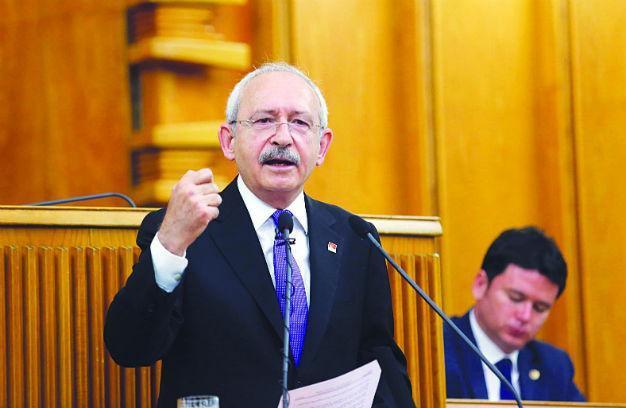Top judges’ impartiality a bubbling cauldron of unrest at parliament
ANKARA

DHA photo
The leaders of the Republican People’s Party (CHP), Peoples’ Democratic Party (HDP) and Nationalist Movement Party (MHP) all maintained their severe criticism of the heads of the country’s supreme courts for accompanying President Recep Tayyip Erdoğan in a recent domestic tour, during their regular weekly addresses delivered to the parliamentary group meetings of their parties on May 31.
According to CHP leader Kemal Kılıçdaroğlu, Supreme Court of Appeals President İsmail Rüştü Cirit, Council of State President Zerrin Güngör and Court of Accounts President Recai Akyel, who all accompanied Erdoğan during his visit to the Black Sea province of Rize, known as Turkey’s “tea capital,” went to Rize “to drink a cup of tea” upon the president’s invitation.
“Let me say it with Erdoğan’s own remarks: The three went to Rize along with Erdoğan in order to analyze tea. I criticized it and then I saw that they went to Kırşehir,” Kılıçdaroğlu said.
Erdoğan’s visit to Rize took place on May 26 and the three top judges accompanied him during a visit to the Central Anatolian province of Kırşehir on May 27 too.
“He [Erdoğan] said ‘Legislation and judiciary are obstructions for me.’ If so, what are you doing there, Dear Presidents of the Supreme Court of Appeals, the Council of State and the Court of Accounts?” he asked.
Noting that Cirit had suggested that it was “extremely natural” for them to accompany the president, HDP co-leader Selahattin Demirtaş duly provided an open invitation to the three judges to attend their party’s rally in Istanbul on June 5.
“It will be more enjoyable than picking tea leaves. You have my word,” Demirtaş said, referring to photographs showing Cirit, Güngör and Akyel while picking tea leaves along with Erdoğan and his spouse, Emine Erdoğan, during the visit to Rize.
“He [Erdoğan] says, ‘We lifted immunities, now the judiciary will fulfill whatever is required,’ and the president of the Supreme Court of Appeals there applauds,” Demirtaş said.
A constitutional amendment submitted by the ruling Justice and Development Party (AKP) was endorsed by 376 of 550 lawmakers on May 20 to lift the immunities of 148 lawmakers, facing a total of more than 700 pending cases, mostly from the HDP.
“Now, these men will try us. How are we supposed to call this ‘normal’ judicial activity?” he asked.
MHP leader Devlet Bahçeli, who has faced a leadership battle, issued his criticism through the prism of the challenges against party dissidents as a court-appointed organizing committee announced on May 30 that an extraordinary congress sought by party dissidents would be held on June 19.
“It is in the open that the judiciary, which is surrounded by ‘the parallel’ and ‘those that are pro-government,’ has no strength left in its current shape and with its current outlook,” Bahçeli said, using the Turkish government’s term “parallel” to refer to sympathizers of U.S.-based Islamic scholar Fethullah Gülen.
“And I say that the remaining traces of justice have been erased in that tea field in Rize and joined the choir in Kırşehir,” he said, while vowing to hold a party congress on July 10.
Bahçeli himself set a date of July 10 for an extraordinary congress after a court ruled the assembly should go ahead, saying he would stand again for leadership.
“We do not recognize any congress date other than that,” he said.
Correction by Kurtulmuş
In the meantime, Deputy Prime Minister Numan Kurtulmuş corrected his words about the relationship between the president and heads of the justice.
“The word subordinate was not right when I said ‘heads of the judiciary are subordinate to the president.’ It should rather be connected. I tried to recall Article 104 of the constitution,” Kurtulmuş told Ankara bureau chiefs of some media outlets on May 31.
“Judiciary members, high judiciary members, and presidents all attend meetings if the president calls,” Kurtulmuş said at a press conference following a weekly cabinet meeting on May 30, in remarks subject to strong criticism.
Demirtaş and EU diplomats
Meanwhile, Demirtaş held a lengthy meeting with diplomats from the 28 members of the European Union on May 30.
The two-and-a-half-hour-long meeting was hosted by Hansjörg Haber, the head of the EU delegation.
Demirtaş reportedly reiterated that the stripping of their immunities was unconstitutional and noted that they would not willingly go to courts to testify in the event that they are summoned.
